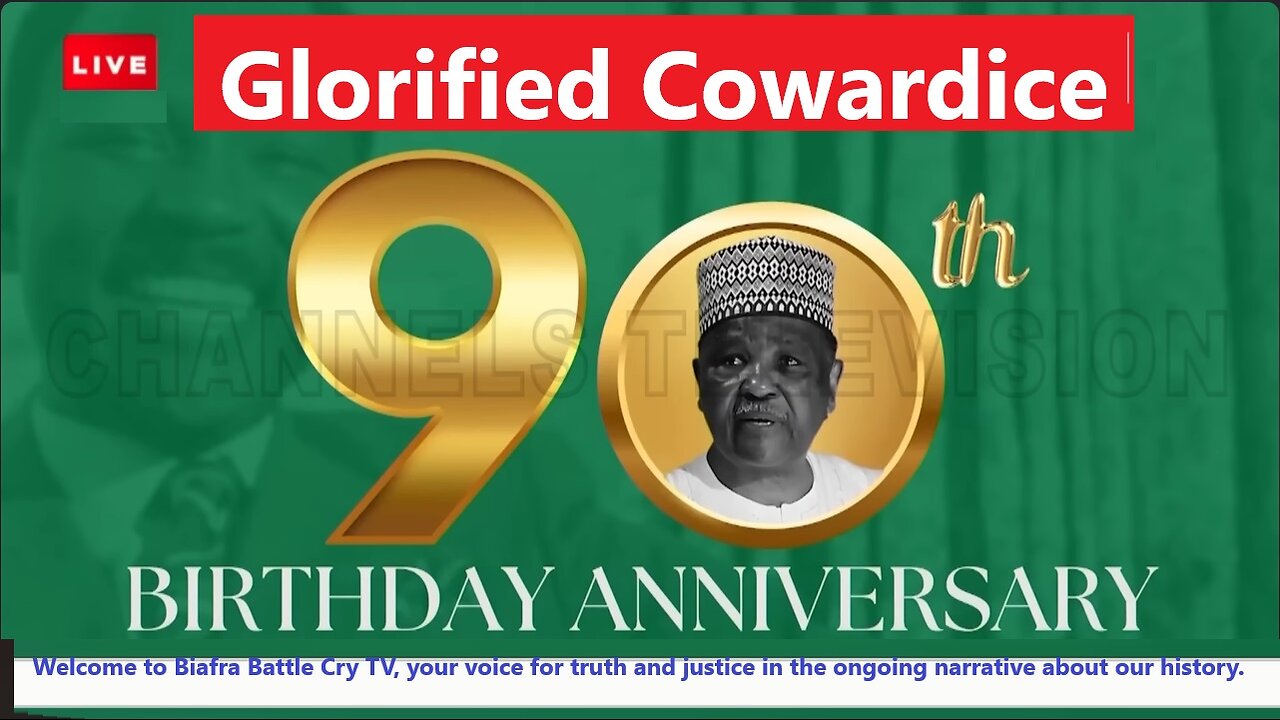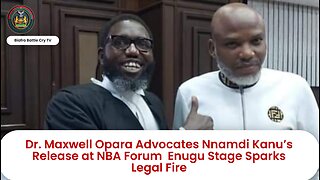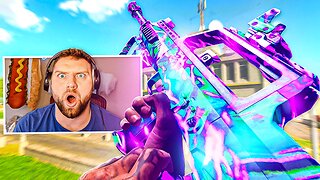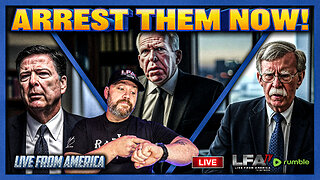Premium Only Content

Misconceptions and Gowon’s Role in Its Outbreak & 90th Birthday Cowardice || The Nigerian Civil War
Title: The Nigerian Civil War: Misconceptions and Gowon’s Role in Its Outbreak
The Nigerian Civil War, often referred to as the Nigeria-Biafra War, has long been misunderstood by many who believe that the desire for secession by the South-East, particularly the Igbos, was the primary cause of the conflict. However, this perspective overlooks the critical role played by the poor leadership of General Yakubu Gowon, who was Nigeria’s Head of State at the time. This analysis seeks to challenge the narrative that the Igbo people initiated the war solely to create an independent Biafra and instead emphasizes how Gowon’s actions and leadership failures fueled the crisis that eventually erupted into a full-scale civil war.
Gowon's Leadership Failures
At the heart of the issue was General Gowon’s weak and indecisive leadership, which many argue was characterized by a combination of youthful inexperience, immaturity, and a deep-rooted colonial mentality. Gowon, who took control of Nigeria in a military coup in 1966, was faced with the immense task of holding the country together amidst growing ethnic tensions. However, his inability to effectively manage these tensions, especially regarding the escalating violence against the Igbo people, was a major contributing factor to the war.
One of the most glaring examples of Gowon’s leadership failures was his refusal or neglect to stop the widespread killings of Igbos and their look-alikes across Nigeria, particularly in the North. These brutal attacks, carried out by both civilians and members of the Nigerian Armed Forces, were largely unchecked by the government. As the killings continued, many Igbos fled to the Eastern Region, seeking safety from the violence. Gowon’s failure to take decisive action to protect the lives of these citizens led to growing resentment and mistrust between the Eastern Region and the central government.
Lack of Support for Displaced Igbos
In addition to his failure to stop the killings, Gowon also refused to provide financial assistance to the Eastern Region Government to support the displaced and injured Igbos who had returned to their homeland. This lack of support exacerbated the humanitarian crisis in the East, where thousands of people were left without adequate shelter, food, or medical care. Rather than addressing the plight of the displaced, Gowon seemed more focused on consolidating his power and maintaining control over the country, further alienating the Eastern Region.
The Rejection of the Aburi Accord
One of the most critical moments leading up to the war was Gowon’s refusal to honor the Aburi Accord, a peace agreement reached in Aburi, Ghana, in January 1967. The accord, which was negotiated between representatives of the Nigerian government and the Eastern Region, was seen as a potential solution to the growing crisis. It called for a decentralized government structure that would grant more autonomy to the regions while still maintaining the unity of the country. However, upon returning to Nigeria, Gowon inexplicably rejected the agreement, choosing instead to maintain a more centralized form of governance. This decision was a turning point in the conflict, as it convinced many in the Eastern Region that a peaceful resolution to the crisis was no longer possible.
Igbo Self-Defense
Contrary to the narrative that the Igbo people initiated the war in a bid for secession, it is important to note that the Igbo primarily fought in self-defense. The violence and persecution they faced across Nigeria, coupled with the refusal of the federal government to provide protection or assistance, left them with little choice but to defend themselves. The declaration of the Republic of Biafra in May 1967 by Colonel Odumegwu Ojukwu, the military governor of the Eastern Region, was not a decision made in haste but rather a response to the systematic violence and neglect that the Igbo people had endured for months.
Gowon’s subsequent military actions against Biafra were framed as efforts to preserve Nigeria’s unity, but his rejection of peaceful resolutions like the Aburi Accord suggests that he was more concerned with maintaining power than with finding a genuine solution to the country’s ethnic divisions. The war, which lasted from 1967 to 1970, resulted in the deaths of over a million people, many of whom were civilians, and left lasting scars on Nigeria’s national identity.
Conclusion
The Nigerian Civil War cannot be reduced to a simplistic narrative of secession versus unity. The role of General Gowon’s poor leadership, marked by a lack of decisive action to stop the killings of Igbos, the refusal to provide humanitarian support, and the rejection of the Aburi Accord, played a significant role in the escalation of the conflict. The Igbo people, who fought primarily in self-defense, were reacting to the violence and neglect they faced under Gowon’s government. While the war ended in the defeat of Biafra and the reintegration of the Eastern Region into Nigeria, the underlying issues of ethnic division and poor leadership continue to shape the country’s political landscape.
Introduction:
"Good day, viewers! Welcome to Biafra Battle Cry TV, your voice for truth and justice in the ongoing narrative about our history. Today, we will be reflecting on the Nigerian Civil War, a topic deeply tied to the experiences of our people and the lessons we must never forget. As the former Head of State, General Yakubu Gowon, marks his 90th birthday, many in the media will celebrate his leadership. However, here on Biafra Battle Cry TV, it is important we shed light on the other side of the story—one often overlooked or misrepresented.
We will be discussing how Gowon's poor leadership, refusal to stop the massacre of Igbos across Nigeria, and his rejection of peace initiatives like the Aburi Accord were key factors that led to the Biafran War. Contrary to popular belief, the Igbos did not seek war out of a desire for secession but fought in self-defense. We will set the record straight by revisiting these historical facts and presenting an alternative view of Gowon's legacy that many would prefer to ignore.
So, sit tight, as we unpack the real story behind the Nigerian Civil War, challenging the myths around General Gowon's leadership, and ensuring that the truth is never forgotten."
Ending:
"Thank you for staying with us as we explored this important chapter in our history. The Nigerian Civil War remains a painful memory, but it’s also a powerful reminder of our resilience and the necessity of standing up for justice. As we close today's broadcast, remember that Biafra Battle Cry TV is committed to bringing you the truth, no matter how hard it may be to hear.
We look forward to your continued support as we keep the voice of truth alive. Stay strong, stay informed, and stay proud of who we are. This is Biafra Battle Cry TV, signing off. God bless, and see you next time."
Yes, I can provide additional evidence and expand on some key points to extend the presentation. Here are several areas that could be added to the broadcast to highlight Gowon’s role and the atrocities committed against the Biafran people during the war:
1. The Role of Starvation as a Weapon of War
One of the most tragic and well-documented aspects of the Biafran War was the use of starvation as a deliberate strategy by the Nigerian government. Under Gowon's leadership, the federal forces enforced a blockade on Biafra, cutting off food, medical supplies, and other vital resources to millions of civilians. This inhumane tactic resulted in widespread famine, with images of malnourished children becoming a symbol of the Biafran struggle. The Red Cross and other humanitarian organizations were obstructed from providing adequate relief, leading to the death of over a million civilians, mostly children, due to hunger and disease.
This aspect of the war is critical because it illustrates the genocidal nature of the Nigerian government's actions under Gowon, targeting civilians in an attempt to crush the will of the Biafran people.
2. The Role of International Involvement
Gowon's actions during the war were bolstered by international powers that provided military and logistical support to the Nigerian government. The United Kingdom, the former colonial power, supplied arms and equipment to the Nigerian forces, while turning a blind eye to the atrocities being committed. The moral failure of these international actors, combined with Gowon’s refusal to engage in meaningful dialogue to stop the bloodshed, intensified the suffering of the Biafrans.
Highlighting the complicity of external powers provides a broader context for understanding why the war dragged on for as long as it did, and how Gowon’s leadership benefitted from this global indifference.
3. The Asaba Massacre
Another major atrocity during the war was the Asaba Massacre of October 1967, in which federal troops executed hundreds of Igbo men and boys in Asaba, a town on the western bank of the Niger River. The Nigerian army accused the townspeople of supporting Biafran forces, and in a brutal reprisal, gathered male residents together and summarily executed them. Women and children were also subjected to violence and abuse.
The Asaba Massacre stands as one of the most heinous acts of violence during the war, showing the extent to which Gowon's forces would go to suppress any perceived opposition. The lack of accountability for these war crimes continues to haunt Nigeria’s history.
4. Biafran Innovation Amidst War
Despite the extreme hardship faced by the Biafrans, they demonstrated remarkable resilience and innovation. During the war, Biafran scientists and engineers developed indigenous technologies, including weapons and even the famed "Ogbunigwe" bombs, to defend themselves. They also made significant strides in self-reliance by creating makeshift refineries and medicine from available resources, reflecting the spirit of survival amidst overwhelming odds.
While Gowon’s government sought to crush Biafra through starvation and violence, these innovations symbolize the unbroken spirit of the Igbo people and their determination to resist.
5. The Continued Denial of Genocide
Even after the war, Gowon and subsequent Nigerian governments have refused to acknowledge the genocidal aspects of the conflict. To this day, there has been little in the way of official apologies or reparations for the massive loss of life and destruction in the Eastern Region. This denial of responsibility is a painful reminder for the Biafran people and the Igbo community, who still carry the scars of the war.
Adding this discussion emphasizes how the wounds of the past continue to affect the present and why it’s important to keep the memory of Biafra alive.
6. The Call for Reconciliation and Justice
While the war ended with the slogan "No victor, no vanquished," the reality was that the Igbos were left devastated, and many of their communities were not properly rebuilt. Even today, there are calls for reconciliation and justice, including the prosecution of those responsible for war crimes. Highlighting these ongoing demands for justice would help extend the message that true healing in Nigeria requires confronting the past honestly.
---
By including these additional points, you can not only lengthen the presentation but also deepen the analysis of Gowon’s role in the atrocities committed during the Nigerian Civil War. This extended version would provide more context, evidence, and emotional weight to the discussion, making it a powerful and comprehensive 10-15 minute broadcast.
-
 14:39
14:39
Biafra Battle Cry
5 hours agoDr. Maxwell Opara Advocates Nnamdi Kanu’s Release at NBA Forum Enugu Stage Sparks Legal Fire
14 -
 LIVE
LIVE
Major League Fishing
5 days agoLIVE! - Fishing Clash Team Series: Challenge Cup - Day 4
289 watching -
 LIVE
LIVE
Side Scrollers Podcast
1 hour agoCracker Barrel CANCELS Rebrand + OG YouTuber Has Brain Tumor + More | Side Scrollers IN STUDIO
305 watching -
 LIVE
LIVE
The Mel K Show
1 hour agoMORNINGS WITH MEL K - Reexamining the US relationship with International Banks, Treaties, and NGOs 8-27-25
698 watching -
 LIVE
LIVE
The Shannon Joy Show
3 hours ago🔥🔥SAVE Baby Kit! Hospital Injects 2 Pound Baby With Hep B Vaccine Without Mom’s Consent, Injures Him Severely Then Calls CPS On The Family!🔥🔥
172 watching -
 LIVE
LIVE
Viss
1 hour ago🔴LIVE - Improve Your Battle Royale Play with Tactics & Strategy! - PUBG
151 watching -
 43:26
43:26
Grant Stinchfield
3 hours agoBallot Harvesting Scams EXPOSED: Dead Voters, Fake Signatures, Real Crimes
6.8K1 -
 1:01:40
1:01:40
VINCE
4 hours agoThe Democrats' Ticking Time Bomb | Episode 112 - 08/27/25
173K130 -
 LIVE
LIVE
JuicyJohns
4 hours ago $0.62 earned🟢#1 REBIRTH PLAYER 10.2+ KD🟢
56 watching -
 LIVE
LIVE
LFA TV
6 hours agoLFA TV ALL DAY STREAM - WEDNESDAY 8/27/25
4,876 watching